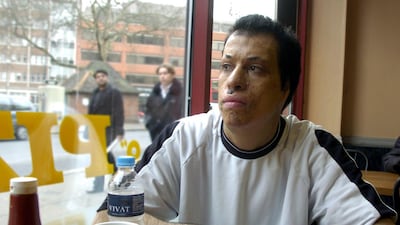A man made famous as a boy when a British politician brought him to the UK for treatment for the horrific injuries he suffered in a bombardment by Saddam Hussein’s regime has been reunited with his Iraqi family nearly three decades later.
Amar Kanim, now 40, was just ten years old when he suffered severe burns in a napalm attack on a warehouse where he was playing on March 1, 1991 in southern Iraq. Anti-Saddam fighters found Amar and moved him from the scene. Doctors were told his family - his mother, three sisters and two brothers - were all killed in the attack.
Weeks later a British politician happened upon Mr Kanim’s case on a fact-finding mission about the fate of civilians in the marshes between the Tigris and Euphrates following the first Gulf War. Meeting the scarred little boy in an Iranian hospital in Ahvaz set in motion a huge fundraising drive to pay for specialist treatment in the UK. He was subsequently brought up under the legal guardianship by Baroness Nicholson and her husband Michael Caine in Devon, where he still lives.
Robert Cole of the AMAR Foundation, set up by the peer and named after Mr Kanim, says the charity made persistent enquiries to find the boy’s family in the early nineties, and were approached by some people claiming to be related to him. Unfortunately none of these enquiries bore fruit.
As much as the case was covered widely at the time, Mr Kanim had never heard from relatives back in Iraq - until a recent slew of Facebook messages from a stranger and a video interview with a woman claiming to be his mother.
“I didn’t believe it to be honest, I thought it was just a big scam really,” said Mr Kanim. “I would like to think it’s true.”
The news investigation programme Panorama took up the challenge and spent over a year attempting to verify claims and track down Mr Kanim’s family, including conducting the crucial DNA test which proved a women called Zahra who lives in the city of Karbala, Iraq, was his mother.
It turns out Mr Kanim’s younger sister Zainab was killed in the same napalm attack. The film said Zahra had searched for her son extensively.
The reunion has, by all accounts, been a happy one. Mr Kanim and his brother and mother were at one point shown comparing a family tattoo and reminiscing about their old lives, apparently without awkwardness.
Despite believing he had lost much of his command of Arabic, Mr Kanim quickly slipped into speaking in the language with his mother.
“I was scared to come here but there’s nothing to be worried about… it’s amazing, it’s overwhelming,” he said.
“This has been the best moment of my life really. It’s like a dream come true. I feel like I’m reborn again.”
“My son is a hero, a superhero,” Zahra told the BBC.
“He missed me. He cares about me and he wanted to find me. This is all I ever wished for. We had wars. So many wars. I lost Amar. I survived, but I was only thinking about Amar. And now he came back, finally. I’m so happy today. I would do anything for Amar. Anything.”
Mr Kanim will continue to visit his mother and family in Iraq, and has agreed to help other children left in a similar predicament, including talking to an AMAR Foundation school for orphans in Basra in September.
“It’s perfect for us,“ said Mr Cole, “because he’s been through the experiences which countless generations of kids that we’ve looked after have gone through as well and so it’ll be fantastic for him to be able to come over to Iraq”.
Baroness Nicholson is pleased with the outcome for Mr Kanim.
“Family is the most important thing in life,” she told the BBC. “It’s who you are. It’s your identity. From the very beginning I did everything I could to try to trace any of Amar’s relatives in Iraq. I hoped we would find someone, but I struggled.”


